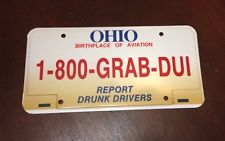 There is a lot of Super Bowl planning going on. Rihanna is planning what songs to sing. Tom Brady is planning to make an appearance as a broadcaster (and later announce his second un-retirement?). Party hosts are planning what food to serve. I am planning to miss our annual party due to Covid (cruel timing). And Ohio law enforcement agencies are planning to arrest drunk drivers.
There is a lot of Super Bowl planning going on. Rihanna is planning what songs to sing. Tom Brady is planning to make an appearance as a broadcaster (and later announce his second un-retirement?). Party hosts are planning what food to serve. I am planning to miss our annual party due to Covid (cruel timing). And Ohio law enforcement agencies are planning to arrest drunk drivers.
Articles Tagged with OVI Lawyer in Columbus Ohio
Change of Venue for Serious Vehicular Crimes in Ohio
 The issue of venue recently arose in an Ohio Vehicular Homicide case. As reported by the Leader-Telegram, the defendant was accused of hitting two highway workers in Clark County. As a result of the collision, one worker died, and the other was seriously injured. The defense attorney filed a motion for change of venue. What is venue, and when can it be changed?
The issue of venue recently arose in an Ohio Vehicular Homicide case. As reported by the Leader-Telegram, the defendant was accused of hitting two highway workers in Clark County. As a result of the collision, one worker died, and the other was seriously injured. The defense attorney filed a motion for change of venue. What is venue, and when can it be changed?
Continue Reading
Legislature Considers Changes to Ohio Marijuana DUI/OVI Laws
 We’ve used this space in the past to discuss issues with Ohio’s approach to DUI (called ‘OVI’ in Ohio) cases involving marijuana. The rising prevalence of marijuana OVIs following Ohio’s legalization of medical marijuana has shown Ohio’s OVI laws are woefully out-of-date to deal with these issues. A recent bill in the Ohio Senate seeks to update the way the law treats marijuana OVIs. This bill, if passed, would have a profound impact on the way marijuana OVI cases are charged, handled by courts, and defended by OVI defense attorneys.
We’ve used this space in the past to discuss issues with Ohio’s approach to DUI (called ‘OVI’ in Ohio) cases involving marijuana. The rising prevalence of marijuana OVIs following Ohio’s legalization of medical marijuana has shown Ohio’s OVI laws are woefully out-of-date to deal with these issues. A recent bill in the Ohio Senate seeks to update the way the law treats marijuana OVIs. This bill, if passed, would have a profound impact on the way marijuana OVI cases are charged, handled by courts, and defended by OVI defense attorneys.
Continue Reading
No Contest Pleas in Ohio DUI/OVI Cases
 Rejecting a No Contest plea may be an abuse of a judge’s discretion, according to a case decided last week by the Ohio Supreme Court. A plea of No Contest is different than a guilty plea, and the plea of No Contest is used for two purposes in DUI (called ‘OVI’ in Ohio) cases. Although a judge’s approval is required for a plea of No Contest, the case decided last week makes it clear a judge’s refusal to give approval may be overturned.
Rejecting a No Contest plea may be an abuse of a judge’s discretion, according to a case decided last week by the Ohio Supreme Court. A plea of No Contest is different than a guilty plea, and the plea of No Contest is used for two purposes in DUI (called ‘OVI’ in Ohio) cases. Although a judge’s approval is required for a plea of No Contest, the case decided last week makes it clear a judge’s refusal to give approval may be overturned.
Continue Reading
Yellow License Plates for DUI/OVI in Ohio
 The special license plates for DUI offenders are commonly referred to as “party plates” and “family plates”. The official term in Ohio is “restricted license plates”. Whatever you call them, nobody wants them. In Ohio, the plates are yellow with red lettering, and they signal to everybody the driver of that vehicle was convicted of DUI (called ‘OVI’ in Ohio). This article explains when the plates are required, how they are obtained, and possible penalties for restricted plate violations.
The special license plates for DUI offenders are commonly referred to as “party plates” and “family plates”. The official term in Ohio is “restricted license plates”. Whatever you call them, nobody wants them. In Ohio, the plates are yellow with red lettering, and they signal to everybody the driver of that vehicle was convicted of DUI (called ‘OVI’ in Ohio). This article explains when the plates are required, how they are obtained, and possible penalties for restricted plate violations.
Where Does Ohio Rank for Drunk Driving Rates?
 Everything gets ranked these days, including sports teams, colleges, students, lawyers, vacations, and products. For products, you can find lists of everything from the best weight-loss pills to the best vacuum cleaners. Neither of those is recommended as a gift, by the way, even though it is the holiday season. And because it is the holiday season, one thing being ranked is drunk driving rates. A recent Forbes article compares the rates among the 50 states and D.C.
Everything gets ranked these days, including sports teams, colleges, students, lawyers, vacations, and products. For products, you can find lists of everything from the best weight-loss pills to the best vacuum cleaners. Neither of those is recommended as a gift, by the way, even though it is the holiday season. And because it is the holiday season, one thing being ranked is drunk driving rates. A recent Forbes article compares the rates among the 50 states and D.C.
Coming to Ohio: Oral Fluid Tests for DUI/OVI

According to a news report by NBC4 Columbus, the state of Ohio intends to use oral fluid testing to obtain evidence of drugged driving. In the video from NBC4, the Ohio Traffic Safety Council indicates there are increasing numbers of crashes caused by drug-impaired drivers. To combat this problem, the Traffic Safety Council recommends that law enforcement agencies implement oral fluid testing. This testing method has some advantages over currently used drug tests, but it also has drawbacks.
Ohio Supreme Court Settles Speedy Trial Issue in DUI/OVI Cases
 In DUI cases (called ‘OVI’ in Ohio), a defendant is sometimes charged with two OVI charges. One charge is OVI ‘impaired’, based on operating a vehicle under the influence of alcohol and/or drugs. The other charge is OVI ‘per se’, based on operating a vehicle with a prohibited concentration of alcohol and/or drugs in the driver’s breath, blood, or urine. In cases involving blood and urine tests, the charge of OVI ‘per se’ is often filed weeks or months after the charge of OVI ‘impaired’ is filed, as law enforcement waits to file the ‘per se’ charge until after receiving the results of the blood/urine test.
In DUI cases (called ‘OVI’ in Ohio), a defendant is sometimes charged with two OVI charges. One charge is OVI ‘impaired’, based on operating a vehicle under the influence of alcohol and/or drugs. The other charge is OVI ‘per se’, based on operating a vehicle with a prohibited concentration of alcohol and/or drugs in the driver’s breath, blood, or urine. In cases involving blood and urine tests, the charge of OVI ‘per se’ is often filed weeks or months after the charge of OVI ‘impaired’ is filed, as law enforcement waits to file the ‘per se’ charge until after receiving the results of the blood/urine test.
In those cases, when does the speedy trial clock start for the later-filed charge of OVI ‘per se’? Is it when the original charge was filed, when the test results were received, or when the second charge is filed? That question was recently answered by the Ohio Supreme Court.
Vegas DUI Seminar: Practice Like a Pro
 I’m not crazy about cold weather, and autumn signals the inevitable temperature decreases in Ohio. On the other hand, autumn also means the O.S.U. football season, as well as the annual DUI defense seminar in Las Vegas. I have attended the seminar about 20 times, and this year I gave a presentation.
I’m not crazy about cold weather, and autumn signals the inevitable temperature decreases in Ohio. On the other hand, autumn also means the O.S.U. football season, as well as the annual DUI defense seminar in Las Vegas. I have attended the seminar about 20 times, and this year I gave a presentation.
Ohio Supreme Court: Forfeiture of $31,000 Vehicle for DUI/OVI Not Excessive
 Back in 1791, when the 8th Constitutional Amendment was ratified, the Framers of the Constitution decided there should be limits on financial sanctions for criminal behavior. Accordingly, the 8th Amendment prohibits ‘excessive fines’. Courts have interpreted the Constitutional prohibition of excessive fines to apply to forfeiture of property in criminal cases. The Ohio Supreme Court recently held that forfeiture of a $31,000 vehicle for a repeat DUI conviction (called ‘OVI’ in Ohio) does not violate the Excessive Fines Clause of the 8th Amendment.
Back in 1791, when the 8th Constitutional Amendment was ratified, the Framers of the Constitution decided there should be limits on financial sanctions for criminal behavior. Accordingly, the 8th Amendment prohibits ‘excessive fines’. Courts have interpreted the Constitutional prohibition of excessive fines to apply to forfeiture of property in criminal cases. The Ohio Supreme Court recently held that forfeiture of a $31,000 vehicle for a repeat DUI conviction (called ‘OVI’ in Ohio) does not violate the Excessive Fines Clause of the 8th Amendment.
 Columbus OVI/DUI Attorney Blog
Columbus OVI/DUI Attorney Blog

